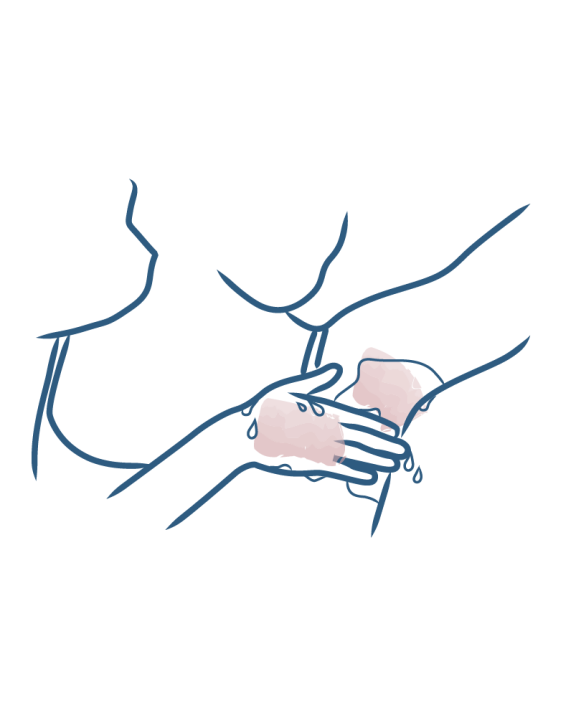How to treat hyperhidrosis?
- How to treat hyperhidrosis?
- Botulinum toxin injections for preventing hyperhidrosis
- Antiperspirant active ingredients for preventing hyperhidrosis
- Iontophoresis for preventing excessive perspiration
- Managing stress and emotions
- Surgery for preventing hyperhidrosis
- Aluminium salts
- Anticholinergic medication for preventing hyperhidrosis

How to treat hyperhidrosis?
Treatments for excessive perspiration are chosen according to the type of hyperhidrosis. It’s not something people always find easy to talk about, often they don’t dare to, and above all they don’t know how to stop this excessive perspiration. Fortunately, lots of solutions exist for treating hyperhidrosis. So don’t hesitate to ask your doctor for advice.
Antiperspirants
Antiperspirants are products proposed as a first-line treatment for excessive perspiration.Your pharmacist will help you find the most suitable solution from the range of products available in their pharmacy.
They usually contain aluminium salts, which block excessive perspiration and prevent bad smells.
We often confuse antiperspirants and deodorants, but they are two very different products. Deodorants mask bad odors by replacing them with fragrance or odor-masking ingredients, while antiperspirants reduce sweat production.
Use of electric current
Iontophoresis is a possible treatment for oversweating. This method consists of using an electric current to reduce sweat secretion.
It is generally proposed for hyperhidrosis of the hands or feet. It must be repeated several times to be effective, and sessions must be maintained over time to remain effective.
Botulinum toxin injections
In case of facial sweating or excessive perspiration of the armpits, hands or feet, and if antiperspirants and/or iontophoresis do not work, botulinum toxin injections can be proposed to treat hyperhidrosis. These subcutaneous injections, into the dermis, block nerve transmissions to sweat glands.
The injections are carried out under local anaesthesia and must be repeated regularly at different intervals depending on the location.
Medicinal treatments
There are some medicinal treatments for hyperhidrosis. They are ingested orally and block the action of acetylcholine.
Acetylcholine is a messenger that circulates in our body and causes a number of reactions, including excessive sweat secretion.
This class of medication can cause side effects, which is why it is proposed only in case of generalized and severe hyperhidrosis.
Surgery: a last resort
If all treatments fail and the hyperhidrosis is particularly severe, surgery can be proposed as a solution for excessive perspiration.
The surgery consists of a sympathectomy, which is the definitive destruction of the sympathetic ganglia that communicate with sweat glands. The procedure can be performed using an endoscope, which reduces the size of the incision and the recovery time. However, compensatory hyperhidrosis may occur on another part of the body.
Some hygiene and prevention measures
In addition to treatments, there are a number of things you can do daily to help improve hyperhidrosis: Drink enough water to compensate for loss through excessive perspiration
- Wash daily with a mild soap that respects the skin’s pH
- Dry skin thoroughly after bathing or showering to avoid the proliferation of bacteria or fungi, which increases in a damp environment
- Change socks every day in case of sweaty feet, and give shoes time to dry before putting them back on (it’s therefore best not to wear the same pair two days in a row)
- Choose clothes made of natural fabrics such as cotton, wool or silk, which allow skin to breathe
- Always have a change of clothing on hand to avoid stressful situations that could further increase sweat secretion
- To prevent feet from sweating, air them as often as possible
Our care routines
Excessive perspiration

